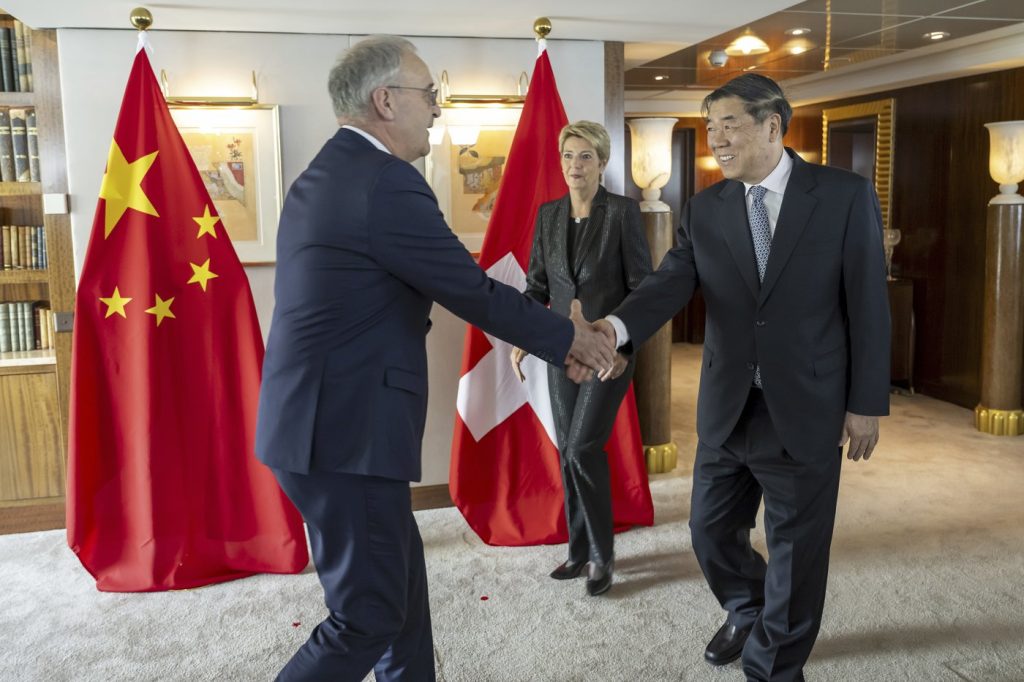GENEVA (AP) – This weekend, U.S. Treasury Secretary Scott Bessent and U.S. Trade Representative Jamieson Greer are set to meet with high-ranking Chinese officials in Switzerland to address escalating trade tensions between the United States and China. The two nations are the world's largest economies, and their ongoing disputes threaten to disrupt global commerce.
The meeting, taking place in Geneva, will involve discussions with a Chinese delegation led by Vice Premier He Lifeng. While substantial breakthroughs seem unlikely, there is optimism that both countries might agree to reduce the significant tariffs imposed on each other's goods. This reduction would provide relief for global financial markets and businesses reliant on trade between the U.S. and China.
Recently, U.S. President Donald Trump raised tariffs on Chinese imports to a staggering combined rate of 145%. In retaliation, China imposed a 125% levy on American goods. Such elevated tariffs effectively signify a boycott of each other's products, causing considerable disruptions in trade, which amounted to over $660 billion last year.
In anticipation of the talks, Trump hinted at potentially lowering U.S. tariffs on China, as noted in a recent Truth Social post. He suggested that an "80% Tariff seems right! Up to Scott," indicating an interest in reassessing the punitive measures currently in place. Sun Yun, director of the China program at the Stimson Center, expressed skepticism regarding the likelihood of significant outcomes, emphasizing that even minimal tariff reductions would be beneficial and that actions must accompany discussions.
Since taking office in January, Trump has aggressively employed tariffs as a primary economic strategy, imposing a 10% tax on imports from nearly all countries. However, the conflict with China has proven to be the most contentious. Trump's tariffs also include a 20% rate designed to pressure China into curbing the flow of synthetic opioids like fentanyl into the U.S. The overall tariffs, particularly those directed at China, can often exceed 145%, complicating the trade landscape further.
During his first term, Trump accused China of engaging in unfair trade practices that benefited their advanced technological sectors, including areas like quantum computing and autonomous vehicles. Allegations included forcing U.S. and foreign companies to relinquish trade secrets for market access, government subsidies for domestic firms, and outright theft of sensitive technologies.
After nearly two years of negotiations, both nations managed to reach a Phase One trade agreement in January 2020. Under this accord, the U.S. refrained from imposing even higher tariffs while China committed to purchasing more American products. However, the pandemic-induced disruption of global trade hampered China’s ability to fulfill these commitments, leaving the more challenging issues, such as subsidies, unresolved.
As tensions regarding China's technology policies resurface, concerns about the substantial trade deficit faced by the U.S. with China, which reached $263 billion last year, are at the forefront of discussions. In Switzerland, Bessent and Greer will also engage with Swiss President Karin Keller-Sutter.
In a previous move, Trump had considered implementing steep 31% tariffs on Swiss goods, even higher than the 20% levies imposed on European Union exports. Currently, those tariffs have been moderated to 10%, although increases are still a possibility.
The Swiss government has taken a cautious stance, warning of negative repercussions on essential Swiss industries such as watches, coffee, cheese, and chocolate. They noted that heightened trade tensions would adversely affect the Swiss economy, particularly by making U.S. imports costlier. As of Saturday, Swiss exports to the U.S. are facing an additional 10% tariff, with another 21% increase set to take effect soon.
The United States is Switzerland's second-largest trading partner after the European Union. Over the past two decades, trade between the U.S. and Switzerland has quadrupled, showcasing the robust economic relationship between the two nations. In a notable development, the Swiss government eliminated all industrial tariffs on January 1 of last year, allowing 99% of U.S. goods to be imported into Switzerland without additional duties.











